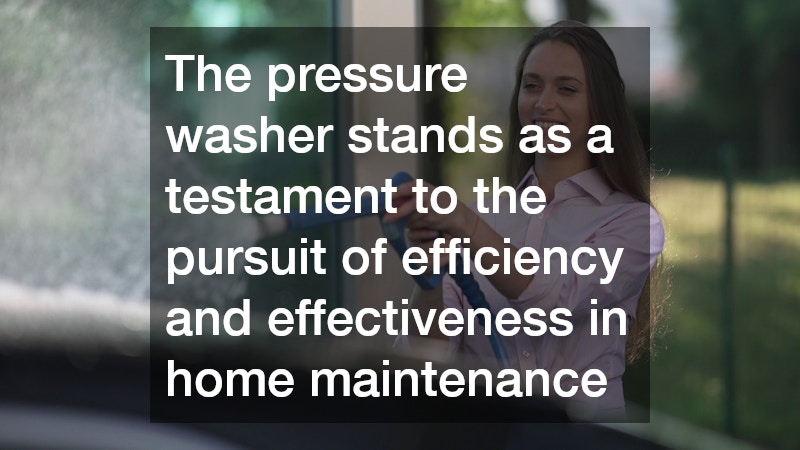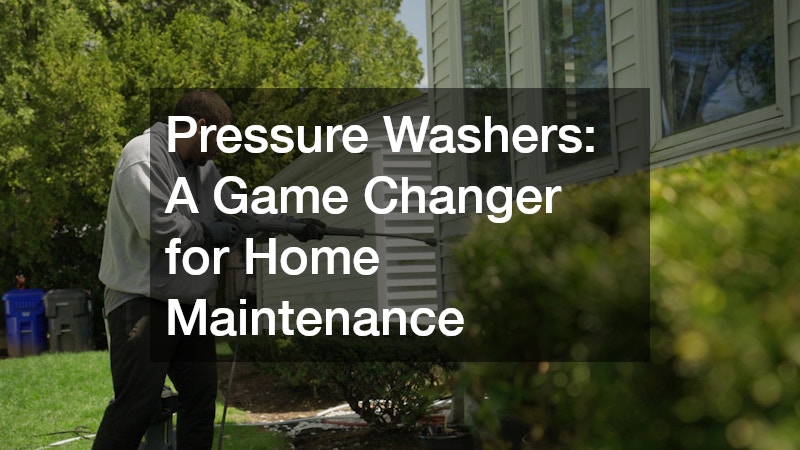Pressure washers have revolutionized the way homeowners approach both routine and heavy-duty cleaning tasks. With their ability to deliver high-pressure water jets that effectively eliminate dirt and grime, they have become indispensable in home maintenance. Beyond their cleaning prowess, pressure washers offer significant time savings, transforming laborious tasks into quick and efficient chores.
How Do Pressure Washers Work?
Basic Components
At the heart of every pressure washer lies a motor, which powers the pump to generate a high-pressure stream of water. The pump is typically the most critical component, dictating the machine’s overall performance. Meanwhile, the nozzle serves as the delivery system, controlling the water’s pressure and spread, making these machines precisely effective for a variety of tasks.
Different nozzles provide varying pressure levels, enabling the user to adapt to various cleaning needs. Standard nozzles often include options ranging from a concentrated 0-degree point to more widespread 40-degree options. This versatility stems from a simple yet effective combination of components working in harmony to tackle diverse cleaning challenges.
Mechanics of Pressure Washing
Pressure washers operate on the principle of using high-pressure water streams to dislodge dirt, grime, and other contaminants from surfaces. The pressure is measured in pounds per square inch (PSI) and the flow rate in gallons per minute (GPM), both crucial for determining the cleaning effectiveness. The interaction between PSI and GPM allows users to optimize their cleaning for specific surfaces, ensuring efficiency without causing damage.
For surfaces like concrete or stone, a high PSI is beneficial to penetrate and lift embedded dirt. Conversely, more delicate surfaces like wood require a balanced combination of PSI and GPM to avoid surface damage while still achieving deep cleaning. The adaptability of pressure washers to fine-tune these variables is a testament to their engineering sophistication.
Benefits of Using Pressure Washers for Home Maintenance
Efficiency and Time-Saving
One of the most significant advantages of pressure washers is their ability to drastically reduce cleaning time. Traditional cleaning methods often require scrubbing, which can be labor-intensive and ineffective for stubborn grime. In contrast, pressure washers cut through dirt with ease, allowing users to complete tasks swiftly and effortlessly.
This efficiency is particularly beneficial for larger areas that would otherwise consume significant time and energy. As a result, homeowners can redirect their focus to other important tasks or simply enjoy more leisure time. By minimizing the effort needed for home maintenance, pressure washers contribute to a more balanced lifestyle.
Versatility in Cleaning Various Surfaces
Pressure washers are remarkably versatile, capable of cleaning a wide array of surfaces including driveways, decks, and siding. Each surface has specific requirements that pressure washers can meet through adjustable nozzles and pressure settings. For instance, a lower pressure setting is ideal for wooden or painted surfaces to prevent damage, whereas higher pressures can efficiently clean concrete.
The capability to adapt to different surface needs makes pressure washers a one-stop solution for diverse cleaning challenges around the home. Homeowners can tackle accumulated grime on stone pathways, refresh outdoor furniture, and even clean vehicles with the same machine. This adaptability not only maximizes the utility of the pressure washer but also increases its cost-effectiveness.
Choosing the Right Pressure Washer for Your Needs
Assessing Your Requirements
Selecting the right pressure washer necessitates a careful assessment of your specific cleaning needs and the types of surfaces you aim to clean. Begin by evaluating the general size and scope of your outdoor space, as larger areas may benefit from a more powerful model. Consider the frequency of cleaning; more regular use might warrant investing in a more robust machine.
Understanding the type of dirt or debris you’ll encounter also guides your decision. For regular yard tasks, an electric pressure washer might suffice, while stubborn stains on concrete might require higher PSI values offered by gas models. Additionally, special attention to surface sensitivity ensures the chosen pressure washer won’t damage delicate areas of your property.
Key Features to Look For
As you explore pressure washer options, certain key features demand attention to ensure you select the most suitable unit. The PSI (pounds per square inch) is crucial for determining the force of water, while GPM (gallons per minute) reflects the water flow, both of which influence cleaning power. Pairing the appropriate PSI and GPM with your specific tasks is essential for effective cleaning without over-exertion.
Accessories, such as surface cleaners and different nozzles, enhance the versatility and help customize the cleaning process. These additions can make a significant difference, allowing you to clean thoroughly and efficiently. Portability is another key feature, particularly for those who need to transport the machine or have limited storage space.
By investing in the right pressure washer, users facilitate easier upkeep and more effective cleaning across diverse surfaces. Furthermore, the environmental benefits of efficient water usage complement conscientious cleaning practices. In embracing pressure washers, homeowners not only streamline their routines but also contribute positively to environmental conservation.
Embracing the modern convenience and efficacy of pressure washers, we invite homeowners to explore how this tool can elevate their property care approach. Equipped with this knowledge, making informed decisions will undoubtedly result in a more polished, well-maintained, and environmentally friendly home environment. The pressure washer stands as a testament to the pursuit of efficiency and effectiveness in home maintenance.
.

